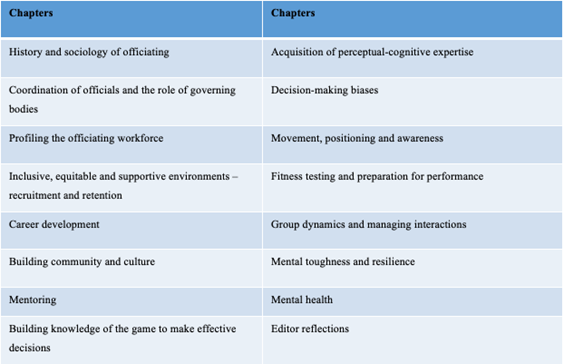Dr Tom Webb, Centre for Business in Society
August 2024 sees the launch of a new book, ‘Managing and Developing Sport Officials: Officiating Excellence’ designed to bridge the gap between research and industry in sports officiating. Bringing together academics and scholars from around the world, all contributing chapters in their areas of expertise, the book provides an evidence-based guide to development, management, and retention from grassroots to professional level, and focuses on the best training and performance practices for sports officials. The book has been co-authored by Dr Tom Webb (Centre for Business in Society, Coventry University, UK), Dr David Hancock (School of Human Kinetics and Recreation at Memorial University of Newfoundland, Canada), Dr Jacob Tingle (Michael Neidorff School of Business, Trinity University, USA), and Professor Pamm Phillips (Deakin Business School, Faculty of Business and Law, Deakin University, Australia).
Why we need this book
Research in sports officiating has evolved considerably in the last ten to fifteen years, with studies mapping the growth of the literature and the associated research agendas over the past ten years. Historically, research published in the area of officiating, or using sports officials as a group to focus upon, has been broadly physiological, psychological or technical and often from individuals and researchers involved with elite football refereeing, with a citation network analysis of publications related to sports officials returning only 115 articles in 2014. This citation network analysis found that there was little connectivity within the literature and that the 12 most cited articles were focused on male football/soccer referees’ decision-making.
Showing the growth of the literature in sports officiating, an integrative review on football refereeing detailed that 82.4% of the studies had been published in the last 10 years. In addition, most of the studies were about physical (n = 74) and technical performance (n = 90), whilst research into trainers, assistant referees and female referees was scarce. More recently, a wider analysis of the officiating literature, not confined to one specific sport for example, between 1971 and 2018 found 386 articles and identified a recent influx in sport officiating research. This research also identified that few studies were dedicated to female-only participants (something which the WINS project and other recent publications focused around women officials have sought to address), whilst there was also a reliance on quantitative studies. As research has developed, it has become crucial to place this research into a wider industry setting, and to ensure that this research can be accessed by the officials themselves. Managing and Developing Sports Officials seeks to make research accessible outside academic circles. An important step in the progression and application of the research in this subject area.
What does the book bring to the research and industry agenda?
Covering all levels of sport, from grassroots to professional, this book focuses on best practices for sports officials and for anybody involved in the management or training of sports officials. The topics included in the book are designed to provide understanding for administrators and to help develop sports officials in their preparation, performance and post-game analysis/reflections.

Each chapter includes a case study to apply and contextualise the content and to show real world application, as well as ‘key messages’ to identify the essential information. The initial chapters focus on topics such as the history of officiating and how officials are coordinated, and the role of governing bodies and sports federations. The final chapter in the first part of the book looks at how profiling the officiating workforce is essential to nurture the officials, and identifies how strategic workforce planning, alongside proactive workforce strategies can maximise the officiating workforce.
Part two of the book focuses specifically on recruiting, retaining and supporting sports officials. Chapters useful to managers, trainers and administrators consider topics such as inclusive, equitable and supportive environments, focused on how organisational support can maximise the potential in the officiating workforce and content related to the career development of officials and how understanding the personal development and progression of officials can help sporting organisations formulate and manage sustainable officiating pathways. The importance of community, culture and support are considered in Chapter 8, whilst continuing the theme of support in Chapter 9, successful mentoring programmes are the focus, and how the positive influence career development for the mentor and the mentee can lead to improved retention.
The final part of the book is specific to developing skills and performance for sports officials. The chapters look at the development of officials to elite level, including building knowledge to make effective decisions, bias and decision making, acquiring perceptual-cognitive expertise and improving training, positioning and awareness, fitness testing and performance, group dynamics and interactions and mental toughness and resilience in officiating.
The publication of this book compliments and extends the ongoing officiating research in the Centre for Business in Society at Coventry University, including the organisation and management of the Referee and Sports Official Research Network, designed to bring together academics, sports official industry professionals and policy makers interested in the research, insight and development of sports officials from around the world. The publication of the Managing and Developing Sports Officials book is the next stage in this process.
Managing and Developing Sports Officials: Officiating Excellence is published by Routledge – further information about the book can be found here.
Through understanding the impact of organisations’ activities, behaviours and policies, the Centre for Business in Society at Coventry University seeks to promote responsibility, to change behaviours, and to achieve better outcomes for economies, societies and the individual.




Comments are disabled